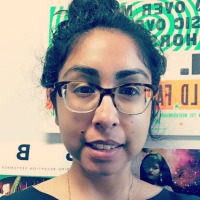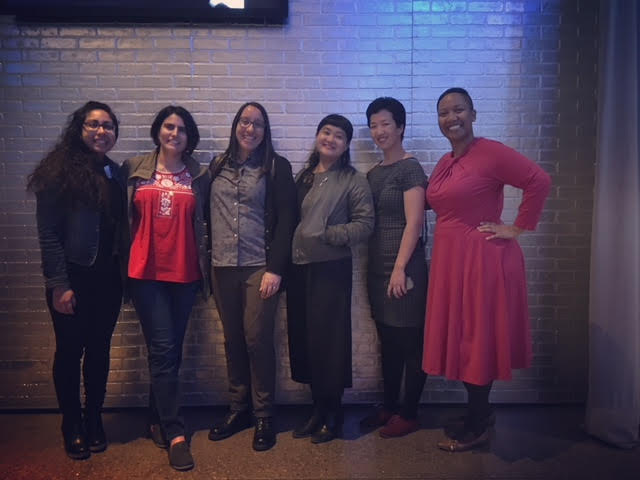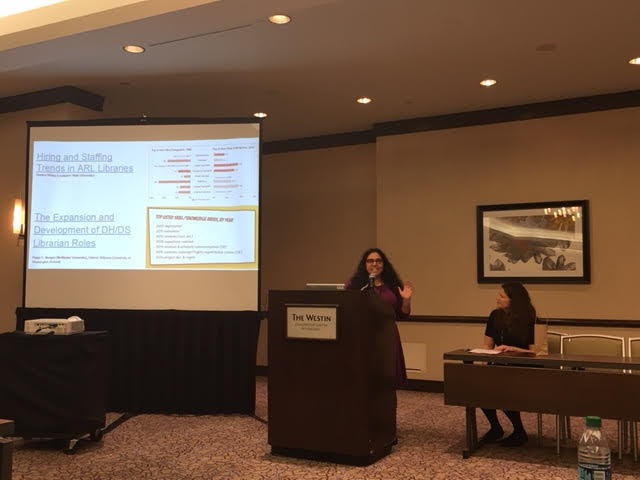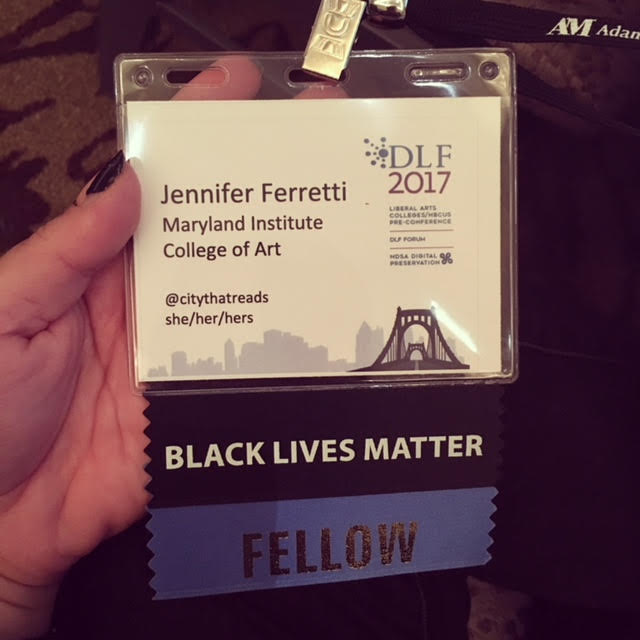
Jennifer A. Ferretti (@CityThatReads) is the Digital Initiatives Librarian at the Maryland Institute College of Art (MICA) and attended the 2017 DLF Forum as an ARL+ DLF Fellow.
I was incredibly excited to receive an ARL + DLF Fellowship to attend the DLF Forum in Pittsburgh last month. I’ve wanted to attend DLF Forum for a couple years now, and I can honestly say it did not disappoint. As the Digital Initiatives Librarian at Maryland Institute College of Art, a fine art and design college in Baltimore, Maryland, I was searching for a conference community that encouraged its members to explore and discuss social justice issues and digital library technologies. I knew DLF Forum would be a unique learning opportunity and connect me with library and digital humanities professionals I may not otherwise have had a chance to meet. In addition to all of these great things, I was struck by how many librarians and archivists attend the Forum. It was also a great space to connect with fellow library workers of color.

I’ve also never been to a conference that had so many discussions about labor and here I’ll talk about just a few of those sessions/presentations. My institution does not offer tenure or faculty status for librarians. This results in a lot of freedom and experimentation that might not otherwise be possible, but it also makes me think about labor and the use of my time. After the amazing keynote delivered by Rasheedah Phillips on community-driven documentation, Afrofuturism, Black Quantum Futurism, and how digital libraries can support marginalized people’s work, I went to the #m1a: Labor+ session. The title of the first presentation by Rafia Mirza and Maura Seale caught my attention immediately: “Dudes Code, Ladies Coordinate: Gendered Labor in Digital Scholarship.” With this presentation on invisible and often ignored labor behind digital scholarship, it set a very healthy, honest tone for the rest of my DLF Forum experience.

Another exceptional session on labor was #t2c: Valuing Labor in Digital Libraries with Melissa Chalmers, Amy Wickner, Ruth Kitchin Tillman, Emily Drabinski, Lisa Janicke Hinchliffe, Graeme Slaught, and Sandy Rodriguez. While I wasn’t there in person (I was in the #t2a: Strategy+ session), I followed along on Twitter and discussed it with attendees afterward. In May 2017, Fobazi Ettarh wrote a blog post titled “Vocational Awe?” and defines the term as thinking of libraries as inherently good, therefore dodging critique and being foundational to how librarians identify and are emotionally invested in the profession. When a national conference like DLF Forum makes room to discuss the undervaluing of labor as a problem of the profession, as opposed to a problem of an individual or individuals, I feel like it’s a step forward toward dismantling the idea of vocational awe.
DLF Forum ended with a community-based panel and open discussion, including new and ongoing DLF community initiatives. With short presentations from working groups, including the Working Group on Labor in Digital Libraries, the DLF/HBCU Library Alliance partnership, DLF/Internet Archive partnership & Open Libraries, and Digital Library of the Middle East and international perspectives, it was an amazing opportunity to learn more about what DLF does year-round.

